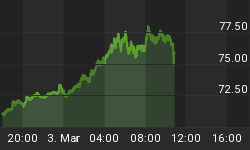Below is an extract from a commentary available to subscribers at www.goldenbar.com on 21st December2005.
 21-Dec-05: If you were surprised at how high oil and gas prices went then you're probably low-balling your gold targets too! Were you amazed at how the stock market has come back in recent years? How about copper, or real estate, or platinum, or silver?
21-Dec-05: If you were surprised at how high oil and gas prices went then you're probably low-balling your gold targets too! Were you amazed at how the stock market has come back in recent years? How about copper, or real estate, or platinum, or silver?
If these things overshot your targets, gold probably will too.
Isn't that your experience with markets anyhow? Don't they ultimately always overshoot the early bulls, or early bears?
This bull is just finding its groove, and I think that instead of calling for another intermediate correction, this time we should put on the jockstraps and make the more difficult call. The crowd is listening at last, even if ostensibly still not persuaded. Still, for it, the voices in the wilderness can finally, though faintly, be made out:
"But the money's unsound, the money's unsound..."
The market knows all about China's growth prospects now.
IT'S IN THE MARKET - probably more than it should be.
What it does not yet want to acknowledge, and to which it still imputes far too little credit when assessing price volatility, is the truth that central banking is INHERENTLY inflationary.
But no matter; this is exactly where the upside in gold thrives.
For, until this truth is widely recognized, nothing will change.
Governments will continue to lean on inflationist doctrines in order to finance the agendas for which they cannot justify a more visible tax (welfare, wars or subsidies); stock and real estate speculators will tend to worship inflation (and the central banks) because of its capacity to stimulate gigantic booms (business) in these assets; even some gold bugs would hate to see central banking go - few have admitted it to me, but nothing drives the returns on gold based investments like the inflationary schematics of the central bank (usually these are the moderates that hide behind the compromise that "some" inflation is okay, or that it is too risky to completely abolish central banking); the borrow and spend crowd is addicted to the doctrines of inflation because the money they pay back tends to be worth less than the money they borrowed; monopolists rely on inflation to alleviate the competitive pressure on prices for their goods - this includes labor (unions are effective labor monopolies) even though labor usually gets the short end of the stick during an inflationary boom; and finally, banks depend on a continuing inflation in bank reserves to multiply the value of their other assets and deposits, and they need a central bank to coordinate the overall policy among member banks. It is an involuntary redistribution of wealth.
But it is also a drug - great for the short term, bad for the long term;it is indeed "the opium of the people."
The point is that until the public starts screaming this stuff about the negative long term effects of inflation on money and prosperity (first it must learn to define it correctly) like it eventually did in the seventies, or like it is currently exaggerating the negative effects of growth in China, there is upside - short or long term (monetary conditions are not exactly loose at the moment, but they aren't tight either; more importantly, the markets are probably aware that the Fed isn't likely to get tighter, or continueits current baby-step tightening campaign).
As long as the doctrine of inflation is progressively embraced as a solution to broad based economic ills, rather than identified as their cause, bull and bear markets in gold will continue to mirror those of Wall Street - or any stock and bond market district in the world that relies on this kind ofmonetary policy to generate its booms.
More follows for subscribers...
















